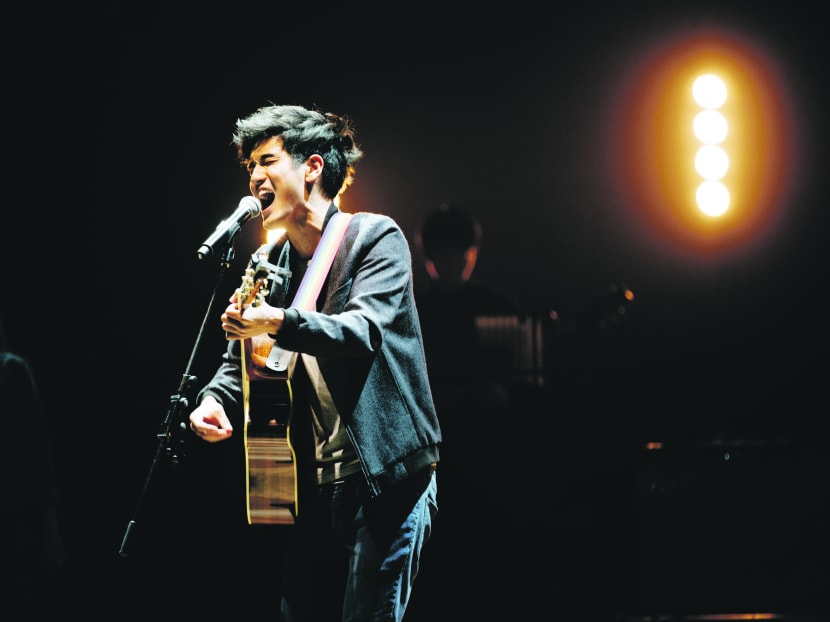Nathan Hartono: ‘I thought I was going to have a nervous breakdown’
SINGAPORE — These are exciting times for Nathan Hartono. Unless you’ve been living under a rock, you might have heard that the 25-year-old recently made waves in China after his rendition of Taiwanese singer Wei Li An’s You Mei You on reality singing competition Sing! China got all four judges — Wang Feng, Na Ying, Harlem Yu and Jay Chou — to hit their buzzers and turn around. His R&B-inspired version of the song drew praise from all the judges, and he eventually chose to be mentored by Chou.

Twenty-five-year-old Nathan Hartono. Photo: Warner Music Singapore
SINGAPORE — These are exciting times for Nathan Hartono. Unless you’ve been living under a rock, you might have heard that the 25-year-old recently made waves in China after his rendition of Taiwanese singer Wei Li An’s You Mei You on reality singing competition Sing! China got all four judges — Wang Feng, Na Ying, Harlem Yu and Jay Chou — to hit their buzzers and turn around. His R&B-inspired version of the song drew praise from all the judges, and he eventually chose to be mentored by Chou.
Hartono has yet to be coached by Chou because the next stage of the competition has not commenced, but he has plenty to keep him busy in the meantime. The music video for his new single, Electricity was released in the first week of July, and the song is now available on digital platforms.
Electricity is the first single Hartono has released in three years. “It’s a fun song inspired by the heady rush of infatuation, where your entire world revolves around one person just for a little while,” the affable singer explained. “It’s a uniquely human experience to go through, and it feels exactly the same whether you’re 13 or 25.”
Q: What was it like performing on Sing! China?
A: I honestly thought I was going to have a nervous breakdown and not be able to function, but the experience turned out to be a lot more chilled than I expected. The audience was warm and receptive, and the judges were really nice. They just felt like real people, so at no point did any part of it feel overwhelming.
Q: Did you expect to get such a fantastic response from the judges?
A: Not at all. I’ve a very realistic view of my own abilities. I know I can sing, but in the context of China, where there’s such a huge talent pool, I didn’t have a yardstick for which to measure my own talent. I just told myself I’d get up there, do what I can, and hopefully it’ll turn a few heads. But I didn’t anticipate getting the response that I did. To this day, I’m still a bit confused by it all!
Q: The video of you singing on Sing! China went viral in Singapore. How did that make you feel?
A: I knew it was going to make the news, but I didn’t know just how big it would become. Only my parents and a handful of close friends knew about it, and I thought it would be more fun for me to keep it a secret because it’s such an unexpected thing to happen. The reach it has had has been pretty mind-blowing. Now, it’s not just students who stop me on the street, but also aunties, uncles, grandmas and grandpas.
Q: There’s a lot happening in your life right now. What’s your main focus?
A: Definitely my English music, because there’s no telling what will happen in China. It is, after all, a competition, and I could be out by the next round.
Q: Besides releasing music in English, you’ve also released a single in Bahasa Indonesia, done stage work and acted on TV. Do you enjoy pushing your boundaries?
A: I like throwing myself into the deep end, because that’s where I learn the most. I’ve approached most opportunities with the attitude of “Let’s do it” and I’m happy I adopted that open-minded approach early on in my life. Otherwise, I might not have done Sing! China. Being on (HBO’s Halfworlds) was probably my biggest challenge to date. Doing a TV series is completely different from live performances because shooting can go on for 18 hours at a stretch. However, doing many different things ensures that I’m constantly kept on my toes.
Q: Do you think that artistes need to cater to Chinese-speaking markets in order to make it big?
A: I don’t think that’s necessarily true anymore. Yes, music geared towards the Chinese-speaking audience is going to be more widely consumed because their population is so much larger, but there are now also many people in the English-speaking music scene who are doing their thing and doing it well, which is encouraging to see. Singapore might not be the number one place to pursue a career in the arts, but it’s a very good training ground, because the audience here — small as it may be — tends to be very critical. They have no qualms letting you know exactly what they think of your music. If you can make it in Singapore, you can make it anywhere.





